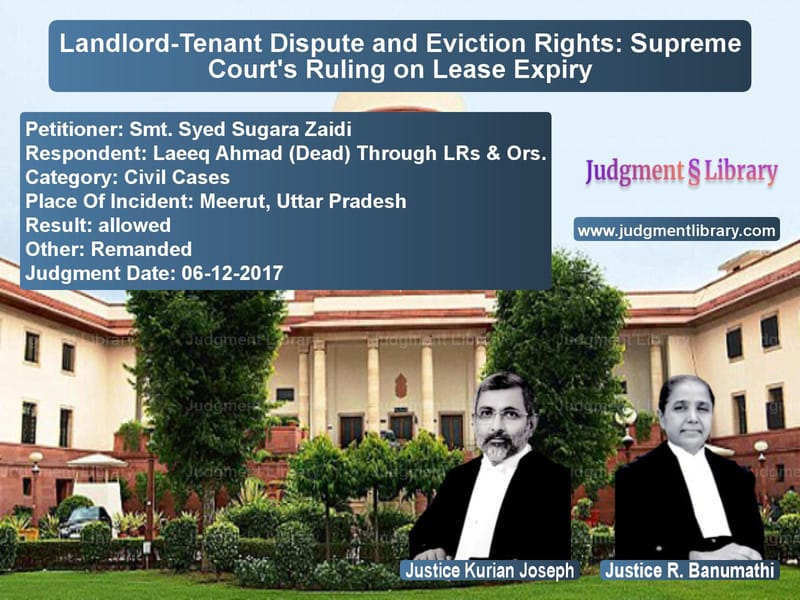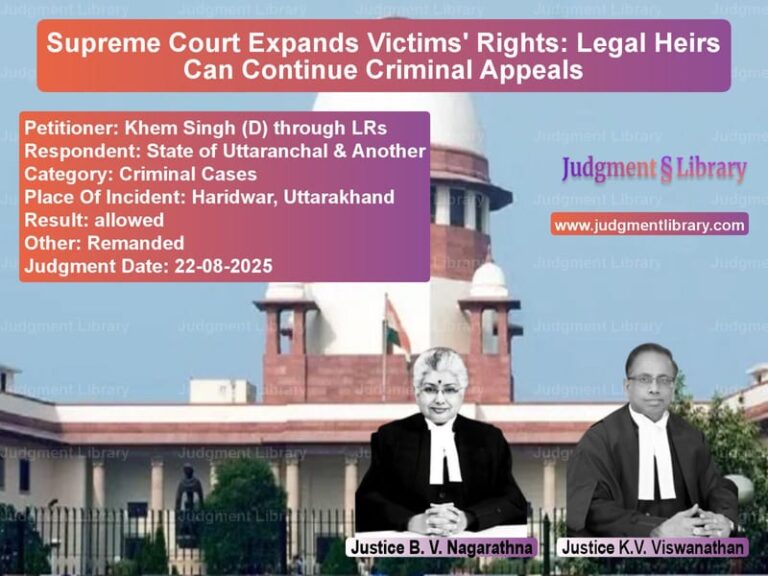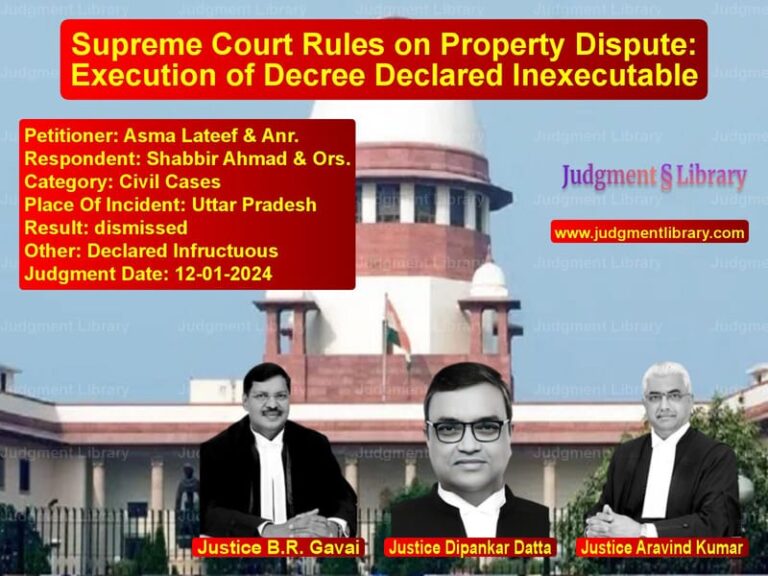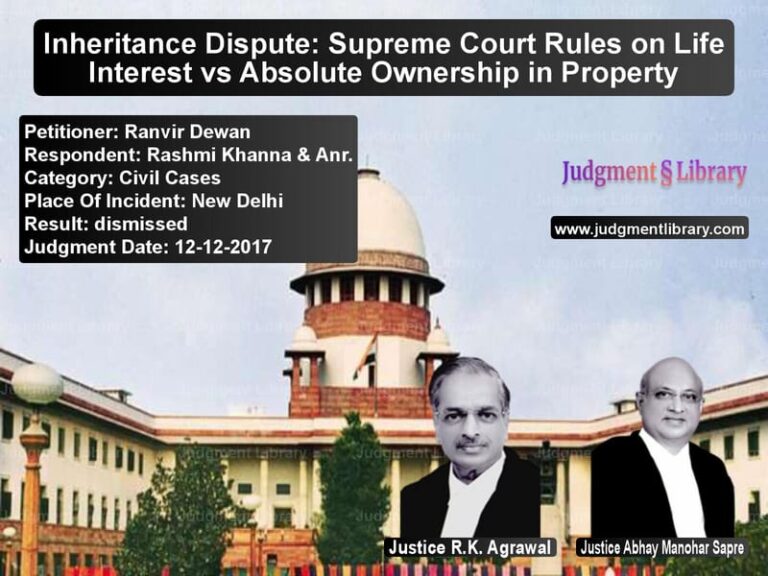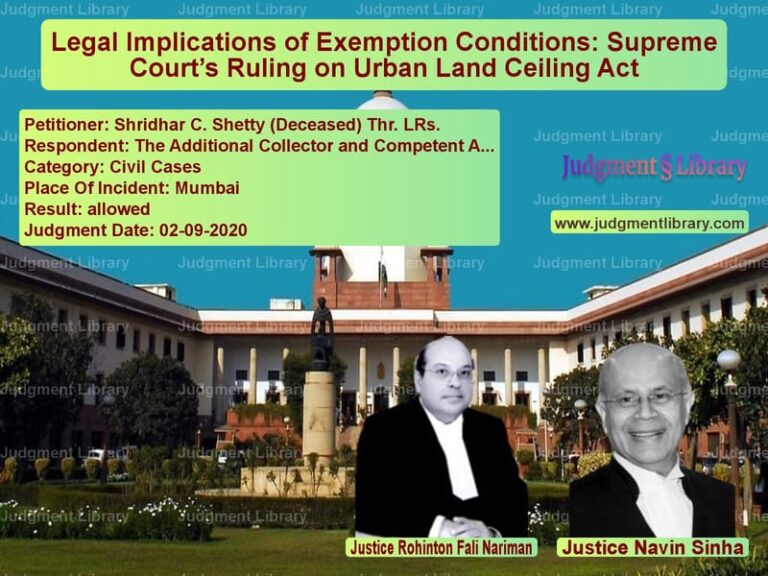Landlord-Tenant Dispute and Eviction Rights: Supreme Court’s Ruling on Lease Expiry
The case of Smt. Syed Sugara Zaidi vs. Laeeq Ahmad (Dead) Through LRs & Ors. revolves around the rights of landlords to evict tenants upon lease expiry and issues related to non-renewal of rent agreements. The Supreme Court had to determine whether the High Court was justified in affirming the trial court’s decision dismissing the landlord’s eviction suit.
The judgment established that when a lease expires, and the tenancy is not renewed, the tenant’s continued possession is illegal. The ruling also clarified that tenants cannot claim indefinite possession by merely continuing to pay rent.
Background of the Case
The dispute arose over a commercial property located in Beli Bazar, Meerut. The original landlord, Nazar Mohammad Zaidi, had leased the premises to the original tenants, Abdul Qayuum and Hazi Anvaruul Haq, through a registered rent agreement dated 12.08.1968. The lease was set for 10 years at a rent of Rs.750 per month, with a renewal clause allowing a five-year extension at an increased rent of Rs.800 per month.
Upon expiry of the lease, the landlord filed an eviction suit (SCC Suit No. 2 of 1981) seeking possession, citing the following reasons:
- The lease term had expired, and the tenants had failed to execute a fresh lease at the agreed enhanced rent.
- The tenants had constructed shops on the premises and sublet them to third parties in violation of the rent agreement.
- The tenants had defaulted in paying rent and municipal taxes.
Arguments by the Petitioner (Landlord)
The landlord’s counsel argued:
- The lease deed was valid only for 10 years, with a conditional five-year renewal, which was never executed.
- The tenants’ continued possession after lease expiry was unlawful, as they did not comply with the renewal terms.
- The tenants violated the lease terms by making unauthorized constructions and subletting the premises.
- The tenants defaulted in paying rent and municipal taxes, making them liable for eviction.
Arguments by the Respondent (Tenants)
The tenants countered:
- They had taken all necessary steps to renew the lease at the enhanced rent of Rs.800 per month, but the landlord refused.
- The landlord had issued a notice in 1978 offering to renew the lease, which indicated his willingness to continue the tenancy.
- The entire rent, including arrears, was deposited in court under Section 20(4) of the Uttar Pradesh Urban Buildings (Regulation of Letting, Rent, and Eviction) Act, 1972.
- The constructions made were within the scope of the lease agreement and did not violate its terms.
Supreme Court’s Observations
The Supreme Court examined the lease agreement, the renewal clause, and the evidence presented by both parties. The Court made the following critical observations:
“A renewal clause in a lease agreement does not automatically extend the lease unless a fresh lease deed is executed in accordance with legal requirements.”
The Court further noted:
“After the expiry of a lease, if the tenant continues to occupy the premises without renewal, he is a tenant by sufferance and can be evicted at any time without prior notice.”
Final Judgment
The Supreme Court ruled that:
- The lease expired in 1978, and the tenants had no legal right to continue possession without renewal.
- The tenants’ claim that they attempted to renew the lease was not substantiated with sufficient evidence.
- The unauthorized construction and subletting of premises constituted a violation of the lease agreement.
- The tenants were directed to vacate the premises within one year, failing which contempt proceedings would be initiated.
Implications of the Judgment
This ruling has significant implications for landlord-tenant disputes in India:
- Reaffirms that a lease expires unless explicitly renewed through a fresh agreement.
- Establishes that tenants cannot claim possession merely by continuing to pay rent.
- Strengthens landlords’ rights to evict tenants who refuse to execute a new lease.
- Clarifies that unauthorized constructions and subletting are valid grounds for eviction.
Conclusion
The Supreme Court’s decision in Smt. Syed Sugara Zaidi vs. Laeeq Ahmad reinforces the legal principle that leases must be renewed explicitly and that tenants cannot indefinitely occupy premises without compliance. This ruling provides clarity for landlords facing similar disputes and ensures that tenancy laws are implemented fairly.
Judgment delivered by: Kurian Joseph, R. Banumathi
Don’t miss out on the full details! Download the complete judgment in PDF format below and gain valuable insights instantly!
Download Judgment: Smt. Syed Sugara Zai vs Laeeq Ahmad (Dead) T Supreme Court of India Judgment Dated 06-12-2017.pdf
Direct Downlaod Judgment: Direct downlaod this Judgment
See all petitions in Property Disputes
See all petitions in Landlord-Tenant Disputes
See all petitions in Specific Performance
See all petitions in Judgment by Kurian Joseph
See all petitions in Judgment by R. Banumathi
See all petitions in allowed
See all petitions in Remanded
See all petitions in supreme court of India judgments December 2017
See all petitions in 2017 judgments
See all posts in Civil Cases Category
See all allowed petitions in Civil Cases Category
See all Dismissed petitions in Civil Cases Category
See all partially allowed petitions in Civil Cases Category

